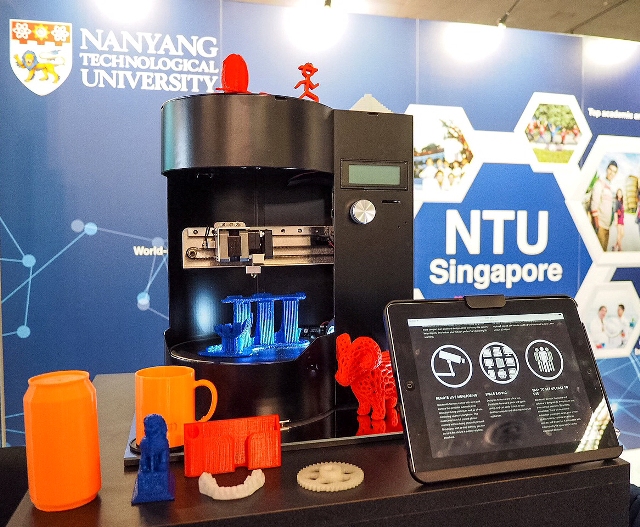Feb 17 2015

The Blacksmith Group, a start-up at the Nanyang Technological University (NTU), has introduced a compact rotary 3D printer that has the ability to scan items and then print them as digitised models.
This all-in-one 3D printer and scanner is claimed to be the world’s first compact 3D printer with this capability. The NTU start-up has unveiled this printer at the American Association Advancement of Science (AAAS) Annual Meeting held in San Jose, California.
The compact rotary 3D printer is a user-friendly device that has been named as the Blacksmith Genesis. It is an easy to use device as even persons who do not have significant knowledge about 3D software will be able to scan any item into digitised models, perform the modifications necessary on these digitised models using a computer, and then print the models in 3D.
A crowdfunding campaign on Indiegogo.com had helped finance the production of the Blacksmith Genesis 3D printer. Early adopters who had supported this crowdfunding campaign would be receiving their printer from the first batch to be shipped out in March 2015.
The Blacksmith Genesis features Wi-Fi, a USB connection, an integrated SD-card reader and a 2” LCD display. It weighs 6kg and has a black aluminium casing housing. This high-tech device has an innovative patent-pending rotary platform for performing scanning and printing functions which allows true 360° scanning.
This unique platform is not found in other types of commercial 3D printers. The Blacksmith Genesis has the capability to print items up to a maximum size of approximately 6.5l or 6,650cm3. Other 3D printers having the same size are able to print only half the size when compared to the Blacksmith Genesis.
The products printed have a fine 50µm resolution, and when compared to reproductions by other 3D printers the Blacksmith Genesis provides twice the details. The new high-tech printer features a 5MP camera that allows it to scan objects in 6 minutes, which is twice the speed of other 3D scanners.
Additionally, this device has automatic error detection and remote live monitoring which is not available in other 3D printers. This unique feature would allow users to use their smartphone to control and monitor the printing process through the Internet from any place.
Dr Alex Pui Tze Sian, an engineering graduate at NTU and Mr Fang Kok Boon are the founders of the Blacksmith Group and they have invented this high-tech device. Mr Fang, who is the CEO of Blacksmith Group, stated that they aspired to make 3D printing easily accessible to average consumers.
“We designed Blacksmith Genesis with the average hobbyist in mind. Most 3D printers sold on the market now are not really user-friendly as their 3D models and blueprints usually have to be designed from scratch on the computer.
“However, with our device, 3D printing will be fuss-free as users won’t need to design an original work from scratch as they can just use our Blacksmith Sorcerer 3D software. By scanning any physical item, they can immediately copy and print the item or use the digitised object as a base to form their own 3D object.”
The first customer who would own a Blacksmith Genesis device would be a resident of Iowa in the United States, Mr Mark Reilly. The fact that the device was an all-in-one unit which allowed printing, scanning and copying was the reason liked by Mr Reilly.
“I think it is cool that I can copy a two-inch item and scale it up to five-inches or vice versa,” explained Mr Reilly. “I was very impressed with the detail of the 3D figurines I ordered and received as well as the photos of objects on their website.”
“The Blacksmith Genesis has a good sized print area that does not take up as much desk space as other 3D printers. I also love the fact that it has a built-in camera for me to monitor and control 3D print jobs remotely. These are the areas which the Blacksmith Genesis differentiates itself from other 3D printers, putting it in a class of its own.”
NTU is a research-intensive, young university and is ranked the top globally among universities that are less than 50 years old. Professor Chua Chee Kai of the NTU is mentoring the Blacksmith Group. In the field of 3D printing, based on data from Thomson-Reuter, Prof Chua is considered to be the world’s most cited scientist.
“3D printing is a disruptive innovation that has revolutionised the manufacturing and biomedical industries,” Prof Chua said. “While low-cost 3D printers are available, they are still very hard to programme and assemble. Having an affordable, high-quality 3D printer that is easy to use is what the market is missing and this is where Blacksmith Group will bridge the gap,” he added.
“Blacksmith Genesis with its unique rotary platform design is a great example of how scientists can bring innovations from the lab to the industry and in this case, all the way into consumers’ homes. It has always been my wish that 3D printers will be as common as the inkjet and laser printers now found in many homes and offices.”
The start-up raised more than $80,000 through the crowdsourcing campaign that was completed in August.